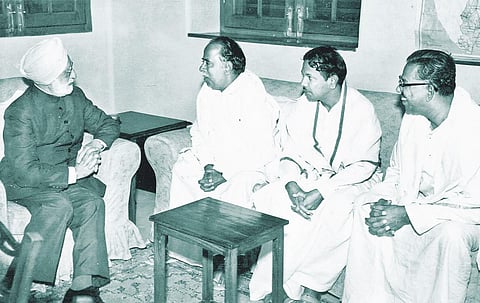

CHENNAI: Autonomy for State governments, an age-old demand of DMK, has returned to become the focal point in this Assembly elections. DMK election manifestos, released since 1957, always begin with a reference being made on federalism. This time, however, the party has gone a step ahead to make the demand specific — to bring education from the Concurrent List to State List. DMK attributes several reasons to explain why it thinks autonomy is an issue now.
The introduction of NEET, UDAY scheme, one nation-one ration card scheme, smart city projects, and National Food Security Act are some areas where DMK perceives a conflict. These new schemes have brought State governments across the country under the Centre’s control in many ways, charge Opposition parties. For instance, Smart City project brought infrastructure improvement works in cities across the country under the Centre’s ambit. That apart, Governor Banwarilal Purohit held meetings with district officials and inspections.
These moves were widely attacked by DMK, and the party’s president has been promising a State government that is not subservient to the Central government. Interestingly, State autonomy was one of the key political agendas for DMK in the 1960s. In its early years, the demand was for the formation of a separate Dravida Nadu. The party formally gave up its demand in 1963 after sixteenth amendment to the Constitution criminalised separatism. The sixteenth amendment was popularly called anti-DMK amendment then.
Later, anti-Hindi agitations of 1965 became the focal point of Centre-State relations. It also popularised its demand through popular slogans “Maanila Suyatchi, Mathiyil Koottactchi,” which means, “autonomy to the State, federalism at the Centre.” In 1969, P V Rajammanar committee was constituted to examine whether the Constitution was truly federal and to suggest amendments so as to secure utmost autonomy to the States.
The Committee which submitted its report in 1971 recommended constitution of inter-State council and suggested that Union Government should not enact new laws that affect one or more states without consulting with the inter-state council. It also suggested abolition of all-India services such as IAS, IPS and IFS and several others. However, the Union government rejected the committee report.
In 1974, DMK presented a white paper in Assembly and passed resolution seeking autonomy. Interestingly, when DMK entered into an alliance with Congress (I) in 1971, it coined another slogan to assert its demand, Urimaikku Kural Kuduppom; Uravukku Kai Koduppom (we shall raise our voice for our rights; we shall extend our hand for friendship). From 1977 to 1989, DMK was repeatedly defeated by MGR led AIADMK in the State. DMK which returned to power in 1989 was dismissed in 1991 followed by the assassination of former Prime Minister Rajiv Gandhi.
However since 1996, when DMK became a part of the Union governments under BJP and Congress, the party has mellowed its voice for autonomy. Between 1996 and 2014, the Centre was run by coalition governments as both BJP and Congress did not have majority in Lok Sabha. Political researchers pointed out that voice for State autonomy gets louder only when a single party gets majority in Lok Sabha. A strong BJP government in the Centre since 2014 created political space for State rights, said a noted researcher.
A resolution seeking autonomy in 1974
In 1974, DMK presented a white paper in Assembly and passed resolution seeking autonomy. Interestingly, when DMK entered into an alliance with Congress (I) in 1971, it coined another slogan to assert its demand, ‘Urimaikku Kural Kuduppom; Uravukku Kai Koduppom’
Four committees on Centre- State relations
◆ 1969, PV Rajammanar committee was constituted to examine whether the Constitution was truly federal and to suggest amendments so as to secure more autonomy to the states. The committee recommended constitution of inter-State council and suggested that Union Government should not enact new laws that affect one or more states without consulting with the inter-state council. It also suggested abolition of all-India services such as IAS, IPS and IFS and several others. However, the Union government rejected the committee report.
◆ In 1983, the Central government constituted Sarkaria Commission to study the Centre and State relations. Although the commission’s recommendations were not made public, it reportedly suggested maintaining status quo in all matters related to legislative powers of Assembly and Parliaments, appointment of Governors and Article 356.
◆ In 2000, National Commission to Review the Working of the Constitution was constituted under chairmanship of the Justice M N Venkatachaliah. The committee recommended constitution of statutory body called Inter-State Trade and Commerce Commission for consultations on matters between the State and the Centre. It also suggested that the Governor should be appointed by a committee comprising the Chief Minister of the state concerned.
◆ In 2007, UPA government constituted Justice M M Punchhi commission to study the relative roles and responsibilities of various levels of government and their inter-relations. This commission had submitted its report in 2010. The committee recommended mechanism on enacting laws on the subjects listed in concurrent lists. It stated that the Centre consults states before introducing a bill on concurrent list items. It also suggested consultation though inter-state council.